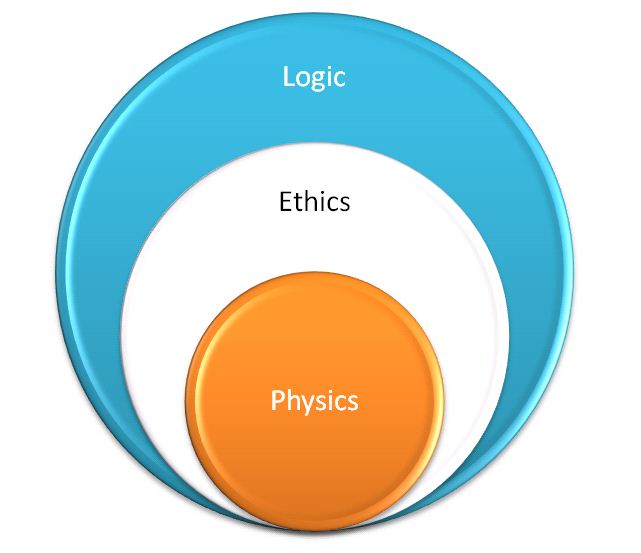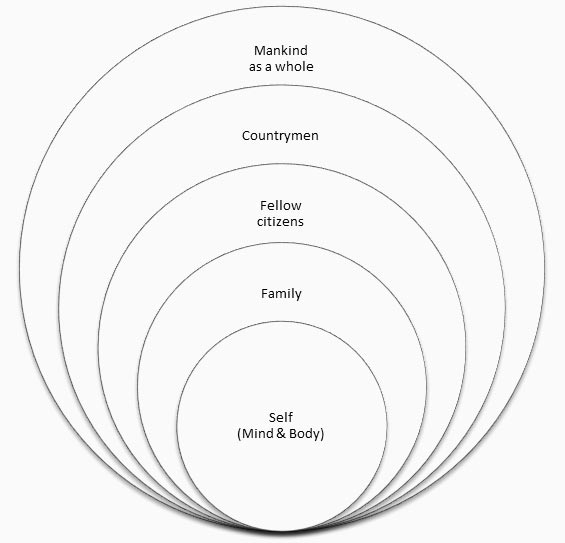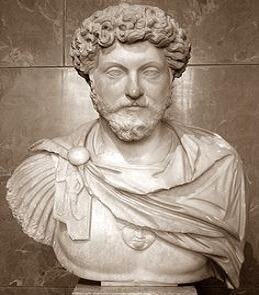Stoicism
Such were the aims of Stoicism, founded by Athens about 310 by Zeno of Citium (in Cyprus), and brought to fuller systematic form by his successors a heads of the school, Cleanthes of Assos, and especially Chrysippus of Soli, who died about 206.
Important Stoic writers of the Roman period include Epictetus and Marcus Aurelius. Their doctrines contained little that was new, seeking rather to give a practical application to the dogmas which they took ready-made from previous systems.
With them philosophy is the science of the principles on which the moral life ought to be founded.
The only allowable effort is towards the attainment of knowledge of human and divine things, in order to thereby regulate life.
The method to lead men to true knowledge is provided by logic; physics embraces the doctrines as to the nature and organization of the universe; ethics draws from them its conclusions for practical life.
Regarding Stoic logic, all knowledge originates in the real impressions of things on the senses, which the soul, being at birth a blank slate, receives in the form of presentations.
These presentations, when confirmed by repeated experience, are syllogistically developed by the understanding into concepts. The test of their truth is the convincing or persuasive force with which they impress themselves upon the soul.
In physics the foundation of the Stoic doctrine was the dogma that all true being is corporeal. Within the corporeal they recognized two principles, matter and force - that is, the material, and the Deity (logos, order, fate) permeating and informing it.
Ultimately, however, the two are identical. There is nothing in the world with any independent existence: all is bound together by an unalterable chain of causation.
The agreement of human action with the law of nature, of the human will with the divine will, or life according to nature, is virtue, the chief good and highest end in life.
It is essentially one, the particular or cardinal virtues of Plato being only different aspects of it; it is completely sufficient for happiness, and incapable of any differences of degree. All good actions are absolutely equal in merit, and so are all bad actions.
All that lies between virtue and vice is neither good nor bad; at most, it is distinguished as preferable, undesirable, or absolutely indifferent.
Virtue is fully possessed only by the wise person, who is no way inferior in worth to Zeus; he is lord over his own life, and may end it by his own free choice.
In general, the prominent characteristic of Stoic philosophy is moral heroism, often verging on asceticism.
The Stoic Egg
The Stoics thought that (practical) ethics was the most important component of their philosophy: it was about how to live one’s life in the best possible way. However, they also believed that it is hard to develop a viable ethics without two other components: understanding how the world works, and appreciating the power and limits of human reasoning.
Stoicism, therefore, was made of three areas of study: ethics (more on this below), “physics,” and “logic.” By physics the Stoics meant something that by today’s meanings would encompass natural science and metaphysics, or what was once called natural philosophy. Of course, many of the original Stoic notions about the world have been superseded by modern science, which would not have surprised the ancient philosophers (they were very conscious of the limits of human knowledge, and very open to revise their specific beliefs).

Briefly, however, Stoic physics included the idea that the universe began in a cosmic fire (and will end the same way, only to begin anew). [The Stoic fire is represented in the symbol in the image at the top of this page.] They also believed that the world is made of matter, and that causation is a universal phenomenon, i.e., everything that happens has a cause. Finally, the universe is organized according to rational principles, the Logos. This can be interpreted as God (for instance in Epictetus), but also simply as the idea that Nature is understandable by way of rationality (which is why we can scientifically investigate it).
A crucial idea that the Stoics derived from their physics is that life ought to be lived “according to Nature,” which can then in turn be interpreted as “in agreement with what Zeus (God) has ordained,” or simply lived according to reason, developing to its best that most specific attribute of the human animal. Being a secular person, I obviously go for the latter interpretation.
In terms of Stoic logic, the word encompassed the study of logic as we narrowly understanding it today, plus rhetoric, epistemology (i.e., a theory of knowledge), as well as what we would call psychology and related social sciences. The Stoics invented a system of logic alternative to that of Aristotle, which was largely ignored throughout the middle ages and beyond, until it began to be appreciated again with the modern advent of propositional logic (of which the Stoic variety is a type).
The Stoics distinguished between the existence of corporeal and abstract things, like a number of modern philosophers do (say, respectively, physical objects and mathematical concepts). They thought that knowledge can be attained by reason, which is in principle capable of separating true from false (they were certainly more optimistic about this than their contemporary and critics, the Skeptics). Importantly, the Stoics also adopted a very modern belief that knowledge can be achieved only by peer expertise subject to collective judgment (the way modern science works, for instance).
Ethics and practical philosophy
The first thing to get out of the way is the misconception that Stoicism is about suppressing one’s emotions and going through life with a stiff upper lip. No, Mr. Spock was not a Stoic (despite the fact that, apparently, Gene Roddenberry imagined the character according to his own, simplistic, view of what a Stoic would be like).
Rather, Stoics taught to transform emotions in order to achieve inner calm. Emotions – of fear, or anger, or love, say – are instinctive human reactions to certain situations, and cannot be avoided. But the reflective mind can distance itself from the raw emotion and contemplate whether the emotion in question should (or should not) be given “assent,” i.e., should be appropriated and cultivated.
To be a little more specific, the Stoics distinguished between propathos (instinctive reaction) and eupathos (feelings resulting from correct judgment), and their goal was to achieve apatheia, or peace of mind, resulting from clear judgment and maintenance of equanimity in life.

The Stoics thought that the good life (eudaimonia, often translated as “flourishing”) consisted in cultivating one’s moral virtues in order to become a good person. The four cardinal virtues recognized by the Stoics were: Wisdom (sophia), Courage (andreia), Justice (dikaiosyne), and Temperance (sophrosyne).
Another crucial Stoic idea, and a corollary of the centrality of virtue in one’s life, is the distinction between preferred and dispreferred “indifferents”: wealth, health, and other goods are indifferent in the sense that they do not affect one’s moral worth (i.e., one can be a moral person regardless of whether one is sick or healthy, poor or rich). But some are helpful in pursuing our goals, and are therefore preferred, while others are an hindrance, and are therefore dispreferred. This makes Stoic doctrine a little less stern than it is usually thought to be (though certainly more so than Epicureanism, or Aristotelian virtue ethics).
Stoics made a sharp (perhaps too sharp) distinction between things that are under our control and things that lay outside of it. The first category included mostly our own thoughts and attitudes, while the second category included pretty much everything else. The idea was that peace of mind comes from focusing on what we can actually control, rather than wasting emotional energy on what we cannot control. However, do not take this as a counsel for despair about affecting human affairs; remember, many prominent Stoics were politicians, generals, or emperors, and they certainly spent a significant amount of energy and resources attempting to change things for the better. But they also accepted that when things didn’t go their way that was it, and there was no sense in dwelling on it.
Indeed, Stoics thought of their philosophy as a philosophy of love, and they actively cultivated a concern not just for themselves and their family and friends, but for humanity at large, and even for Nature itself . Stoic philosophers were interested in improving humanity’s welfare, and some were even vegetarian.
additional source that was used: Stoicism 101













